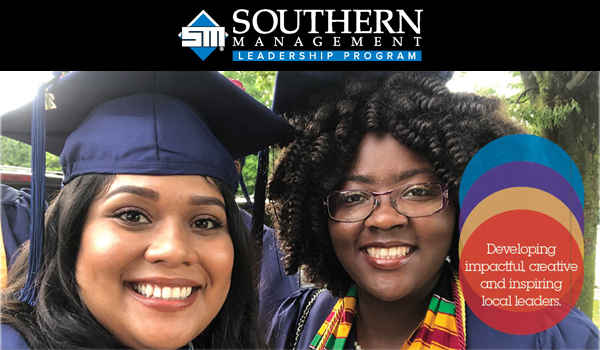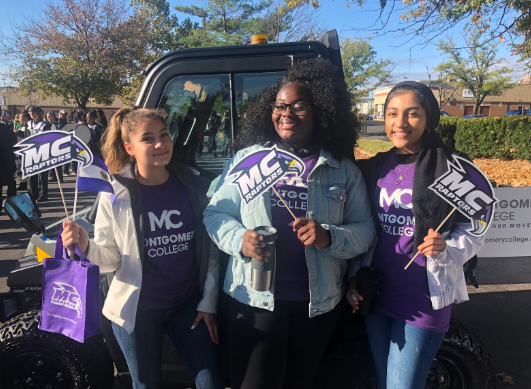Recruitment is open for the next cohort of Southern Management Leaders! If you are a…

The goals for the weekend were 1) to facilitate cohort bonding through shared experience, 2) create deep awareness and empathy for the situations and challenges of the homeless and poor population in DC, and 3) to reflect on personal and group goals for future service as well as how to integrate this experience into life and entrepreneurial planning. Through thoughtful and intentional planning, all of these goals were met. As Hillman student Dimitri Mitrothanasis pointed out, “The biggest takeaway from this trip for me would be the friendships I made. Before the service trip, I knew nobody at PGCC and I am so glad we got a chance to bond with our fellow Hillmaners and grow as a program. I cannot thank Professor Razavi, Professor Lewis and the Hillman program enough for this incredible experience that I will remember and cherish for years to come.”
Hillman student Alona Hapey shared these thoughts: “This community engagement event was very enlightening for me and my classmates. We are at advantage right now being part of this prestigious program, but there is nothing in the world that could guarantee that in any moment of our lives we won’t end up on the street. Despite the difficult times that we might have with our homework or classes, it is nothing comparing to seeking a place to sleep overnight. Moreover, this is not just down to earth experience, but an inspiration to give and contribute to the community . . . . The biggest lesson that we learned from the event is not to be indifferent. The dollar that a person might need to get some food or to get a shelter could be nothing for us, but life-changing for them. It was shocking to learn that some people got frozen to death because they had nowhere to go, or were not able to go.”
The Poverty Simulation and the Direct Service had the greatest impact on the students based on informal discussion afterwards. Through the former, students were assigned realistic roles as family members or employees in service and commerce industries with defined tasks to complete in order to feed their loved ones, pay their rent, keep up with child care and other expenses and meet their obligations to work, school, and personal relationships. This exercise powerfully demonstrated the challenges facing those who work so hard to get from paycheck to paycheck and set the stage for the direct service on day two. Hillman student Luke Knafels shared his experience this way: “For four weeks, I took the role of 40-year-old working man and single father Robert Rogers. Robert has the responsibility of a full-time job, two kids, one grandchild and a multitude of bills. The simulation required the family to use transportation passes that represented time for walking or gas for cars to get from place to place. After an eviction, child services taking my asthmatic 9-year old with learning disabilities away twice, our family finally earned enough to get out of the red and paid everything off. I learned how hostile the environment was, how everything was out of control, time was short and the situation was incredibly tense and stressful.” His reaction reflected that of the other students, who were awakened to the challenges faced every day by many people in our community.
Students were also especially challenged during the direct service through community outreach with the National Coalition for the Homeless. This was a time to bring everything together and into a real situation, not a simulated one. Four volunteers from the NCH led groups of students to the places where people living on the streets are struggling to keep warm, to get a meal, and to maintain their own dignity while facing personal struggles unimaginable to those who live in more privileged circumstances. We were able to connect in our own small way with a number of individuals who were eager to share their stories and concerns with us.
Finally, after much group reflection, shared meals, and workshops designed to bring everyone’s attention to our common humanity and the structural economic conditions that affect all communities, the students met a group of entrepreneurs who are finding their way out of poverty. The Community Craft Collective, started by a group of five women artisans, has grown to a cooperative business that includes craftmakers (jewelers, knitters, and artists), caterers, and cleaning services. In fact, the dinner prepared for the students their first night was catered by one of the members! Other members of the Collective shared their stories and their products with the students and provided an alternative solution for poverty and homelessness for many.
Michelle Salah found the experience “spoke to me  as a person as well as an entrepreneur.” By participating in this community service, she said, “I realized how privileged and blessed I am to have food on my table and to have a roof over my head. . . . This weekend has taught me that I need to think out of the box; I need and want to affect as many people as I can. As I study entrepreneurship and participate in the Hillman program I think more and more that I can create positive change through business.”
as a person as well as an entrepreneur.” By participating in this community service, she said, “I realized how privileged and blessed I am to have food on my table and to have a roof over my head. . . . This weekend has taught me that I need to think out of the box; I need and want to affect as many people as I can. As I study entrepreneurship and participate in the Hillman program I think more and more that I can create positive change through business.”
Program Director Rebecca Razavi described the event this way: “This was the most amazing service experience I have encountered, with thoughtful programming that included all types of learning to make the learning meaningful and life changing. Thank you to the Steinbruck Center and to Sarah Johnson for hosting us. We will be back!”
 as a person as well as an entrepreneur.” By participating in this community service, she said, “I realized how privileged and blessed I am to have food on my table and to have a roof over my head. . . . This weekend has taught me that I need to think out of the box; I need and want to affect as many people as I can. As I study entrepreneurship and participate in the Hillman program I think more and more that I can create positive change through business.”
as a person as well as an entrepreneur.” By participating in this community service, she said, “I realized how privileged and blessed I am to have food on my table and to have a roof over my head. . . . This weekend has taught me that I need to think out of the box; I need and want to affect as many people as I can. As I study entrepreneurship and participate in the Hillman program I think more and more that I can create positive change through business.”Program Director Rebecca Razavi described the event this way: “This was the most amazing service experience I have encountered, with thoughtful programming that included all types of learning to make the learning meaningful and life changing. Thank you to the Steinbruck Center and to Sarah Johnson for hosting us. We will be back!”





This Post Has 0 Comments